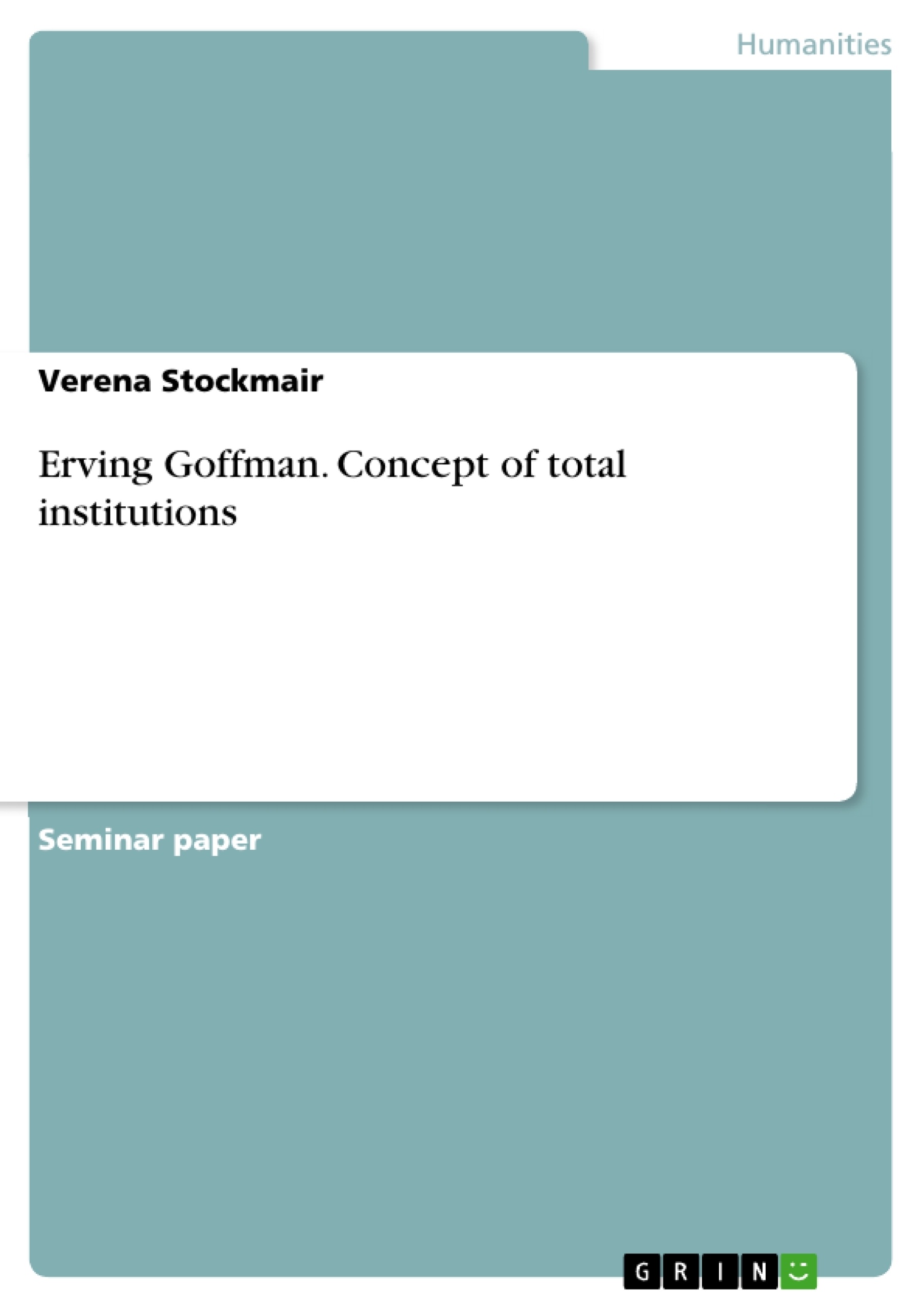In view of the current disclosure of torture in war prisons in Iraq, but also through the disclosure of mistreatment in the Brandenburg an der Havel prison, it becomes clear how explosive the concept of total institutions still is more than forty years after its publication by Goffman.
In his work Asyle, first published in 1961, Erving Goffman (1922-1982) summarizes in four essays his many years of sociological studies on the inmates of psychiatric clinics. From 1954 to 1957, Goffman was a visiting professor at the National Institute of Mental Health in Bethesda, Maryland. During this time he spent over a year doing field studies at St. Elizabeth's Hospital (Washington D.C.), which then had about 7,000 inmates. Goffman's own experiences in dealing directly with the inmates of St. Elizabeth's Hospital are included in the book as well as countless descriptions of other well-known and lesser-known authors (e.g. George Orwell, Herman Melville), who spent some years of their lives in prison, in the monastery, in the boarding school, in an orphanage, in the military or in similar institutions.
Goffman first encountered the term total institution in a 1952 graduate seminar on institutions. Coined by Everett Hughes, the term must have intrigued Goffman from the start. Burns writes: "It is clear from Goffman's course notes (he gave me a copy of them) that is must have been a remarkable teaching enterprise - enlivened with allusions, encyclopedic in is coverage, and radically critical and innovative in is approach." . But while Goffman thought of the term social institution in a way that differed from Hughes', he adopted the term total institution in Hughes' sense. For Hughes, these were "social institutions which were much more shut off from the outside world" - he cites nunneries as an example - Goffman accordingly relates his observations to "the situation of those 'extruded' from society'.
In this work, the aim is first to present Goffman's concept of total institutions and to go into the points of view of the inmates, the staff and the points of contact of both groups. Subsequently, the concept should be examined and assessed with regard to its possible application and possibilities should be found to further differentiate the concept.
Table of Contents
- Introduction
- The concept of total institutions
- Goffman: On the characteristics of total institutions
- Definition
- The occupants
- Assessment of the concept
- Goffman: On the characteristics of total institutions
- Concluding remark
Objectives and Key Themes
This paper aims to analyze Erving Goffman's concept of total institutions, focusing on his observations of inmates and staff within these institutions. The paper will explore the characteristics that define total institutions, the experiences of occupants, and the implications of Goffman's concept for understanding social control and individual identity.
- The defining characteristics of total institutions
- The impact of total institutions on individual identity and role performance
- The dynamics of power and control between staff and inmates
- The influence of total institutions on social structures, such as the family and work ethic
- The relevance and limitations of Goffman's concept in contemporary society
Chapter Summaries
- Introduction: This chapter introduces the concept of total institutions, highlighting its relevance in light of contemporary events such as the Abu Ghraib prison scandal. The chapter provides an overview of Goffman's life and work, focusing on his field studies at St. Elizabeth's Hospital.
- The concept of total institutions: This chapter delves into Goffman's definition of total institutions, examining the five different categories he identified. It discusses the central characteristic of total institutions – the abolition of the separation between sleeping, working, and leisure time – and the four defining features of this type of institution. The chapter further analyzes the power dynamics between staff and inmates, highlighting the importance of the labor factor and the suppression of traditional social structures.
- Goffman: On the characteristics of total institutions: This chapter examines Goffman's insights into the experiences of inmates in total institutions. It explores how the environment of these institutions disrupts the individual's previously established identity and role performance, leading to a systematic suppression of role distance.
Keywords
The key terms and focus topics of this paper include total institutions, social control, individual identity, role performance, power dynamics, staff-inmate relations, institutionalization, and the impact of social institutions on individual behavior.
- Quote paper
- Verena Stockmair (Author), 2004, Erving Goffman. Concept of total institutions, Munich, GRIN Verlag, https://www.grin.com/document/1177147




